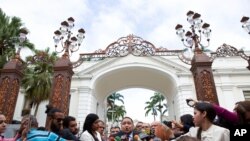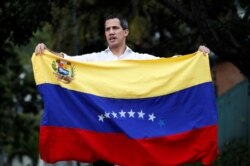Pro-government legislators seized control of Venezuela’s opposition-dominated legislature Sunday, moving to install a backer of President Nicolas Maduro as National Assembly president while government security forces blocked opposition lawmakers from entering the building.
The move, denounced as illegitimate by the opposition, is seen as a bid to undermine the authority of Assembly President Juan Guaidó, whose rival claim to the office of national president is recognized by nearly 60 countries including the United States.
"At this time, Venezuela has no parliament in place," Guaidó told reporters after being unable to enter the Assembly. Other opposition lawmakers denounced the pro-government ploy as a "parliamentary coup."
Guaidó had been expected to be re-elected to a second one-year term as Assembly president in a scheduled vote Sunday, given the opposition’s strong majority in the chamber.
Instead he found himself trying unsuccessfully to clamber over a spiked fence to reach the Assembly, tearing his suit jacket and tussling with security forces.
He then delivered a lengthy denunciation of the government move during an impromptu news conference in the street outside the Assembly.
Inside the building, Maduro-controlled state television was broadcasting the swearing-in as Assembly president of Luis Parra, a former opposition politician who recently broke with Guaidó after being accused along with other opposition legislators in a corruption scandal.
It was not immediately clear whether the pro-Maduro lawmakers actually voted before the swearing-in ceremony. Guaido’s supporters in the legislature – at least some of whom were also held at bay by security forces – insisted that any vote was invalid anyway because there were not enough legislators present to form a quorum.
That view is shared by the U.S. government, which has led international support for Guaidó. Acting Secretary of State for Western Hemisphere Affairs, Michael Kozak, rejected the installation of Parra as illegitimate in a Sunday tweet.
"The desperate actions of the former Maduro regime, illegally forcibly preventing Juan Guaidó and the majority of @AsambleaVE deputies from entering the building, make this morning’s "vote," which lacks quorum and does not meet minimum constitutional standards, a farce," he said.
The day’s events left severe doubts about the future of the Assembly, which many had considered the last remaining legitimately elected government body in Venezuela. The nation may now be confronted with not only two rival claims to the presidency but also to the National Assembly leadership.
Guaidó’s international backing rests on the fact that, as Assembly president, he is Venezuela’s highest-ranking official to have been democratically elected.
In a briefing to the media late Sunday, U.S. President Donald Trump was asked by VOA White House Senior Correspondent Patsy Widakuswara
where he stands on Venezuela.
"We are with the people of Venezuela," Trump said, but declined to say which side would he support.
Maduro has used increasingly authoritarian means to cling to power in the face of widespread opposition to his rule and a catastrophic economic collapse. Millions of refugees have fled the country due to the unavailability of basic commodities, creating a crisis for neighboring countries.
Maduro’s ability to remain in power owes much to the support of the armed forces, which have remained loyal despite efforts to recruit them to the opposition cause. The nation’s courts are also largely supportive of Maduro, complicating any effort to have the Assembly takeover declared illegal.
VOA White House Senior Correspondent Patsy Widakuswara on Air Force One contributed to this report





